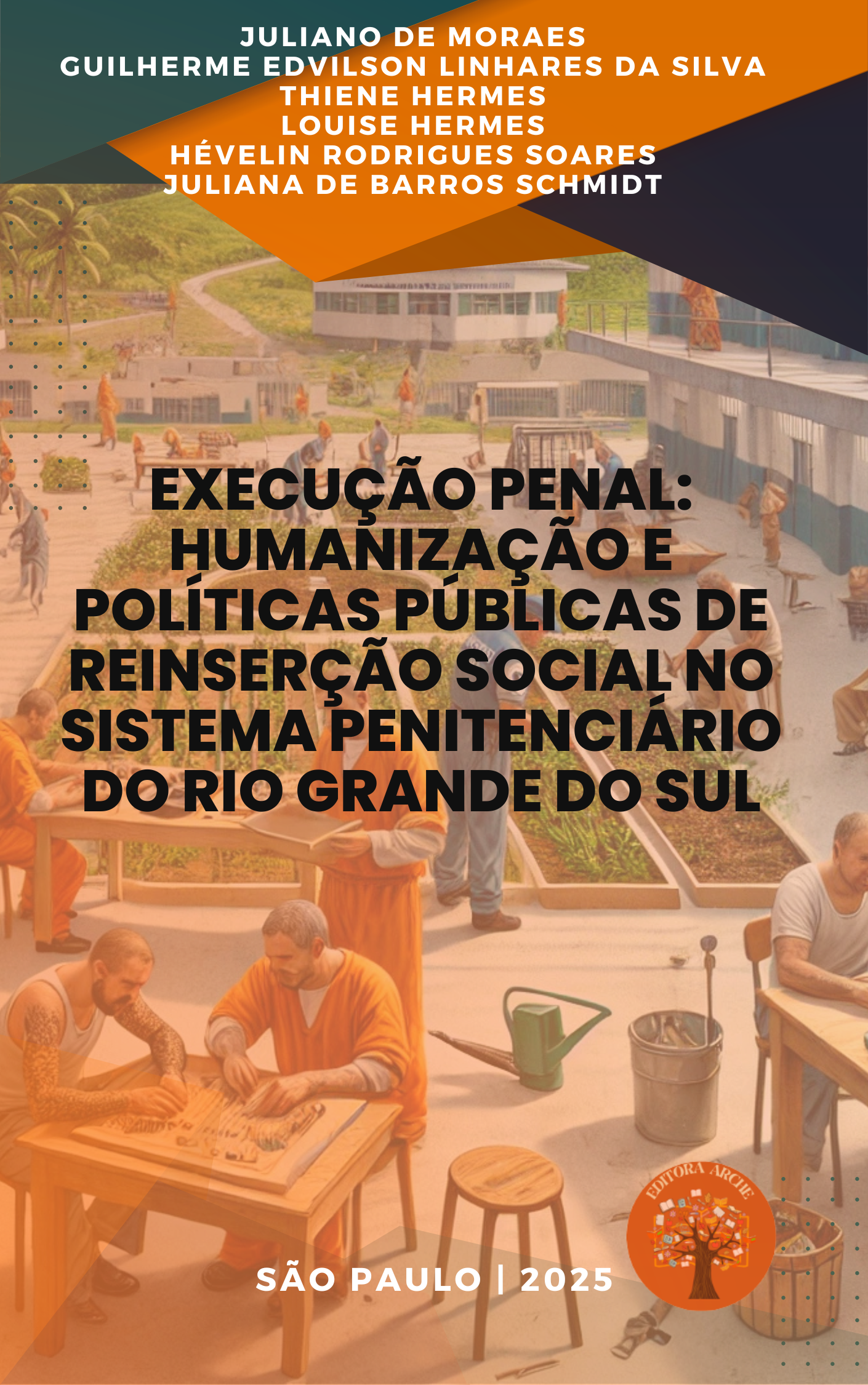EXECUÇÃO PENAL: HUMANIZAÇÃO E POLÍTICAS PÚBLICAS DE REINSERÇÃO SOCIAL NO SISTEMA PENITENCIÁRIO DO RIO GRANDE DO SUL
Keywords:
Penal execution. Public Policies. Humanization. Social Reintegration.Abstract
Sentencing in Brazil is one of the major challenges facing the criminal justice system, especially in light of the progressive increase in the prison population and the persistence of structural problems that directly affect the human rights of prisoners. The state of Rio Grande do Sul, despite having regional policies and initiatives, faces serious difficulties in overcoming historical issues related to overcrowding, precarious prison facilities, and the inefficiency of programs aimed at the social reintegration of prisoners. This digital book proposes a comprehensive analysis of this scenario, addressing the execution of sentences from a humanitarian perspective, based on the implementation of public policies that promote resocialization and combat criminal recidivism.
Recent data released by the National Council of Justice (CNJ) indicate that the Brazilian prison population surpassed 830,000 people in 2023, placing Brazil among the countries with the highest number of inmates in the world. As part of this context, Rio Grande do Sul suffers from an overcrowded prison system, where the installed capacity of prison units is constantly exceeded. Overcrowding, combined with deficient infrastructure, generates degrading conditions, compromising not only the fundamental rights of inmates, but also the system's ability to fulfill its resocialization function.
Historically, the Brazilian prison system has prioritized incarceration as the main response to crime, neglecting the importance of policies aimed at education, professional training and social reintegration of inmates. In Rio Grande do Sul, this reality is even more evident, with alarming recidivism rates that reflect the absence of structured and continuous rehabilitation programs. This issue is widely discussed in the book, highlighting how historical neglect compromises the effectiveness of criminal enforcement measures.
The first chapter, entitled "Society, Public Security and the Penitentiary System", provides the reader with context regarding the challenges faced in contemporary times in relation to public security. It addresses the impact of mass incarceration policies, which are often disconnected from a careful analysis of crime and its structural causes. The chapter also discusses the relationship between the increase in incarceration rates and the effective security of society, questioning the prevailing punitive logic.
The second chapter, "The Historical Neglect of Public Policies in the Penitentiary System", analyzes how the lack of consistent investment and strategic planning resulted in the current crisis in the prison system. This chapter delves into a historical analysis, highlighting how insufficient and disjointed public policies contributed to the worsening of prison conditions and the perpetuation of social exclusion of thousands of individuals.
The third chapter, "Humanization and Public Policies for Social Reintegration", is the core of the work and presents a constructive approach to overcoming the deficiencies of the penitentiary system. Concrete proposals for humanizing the execution of criminal sentences are discussed, with a focus on valuing human dignity, respecting the rights of prisoners and implementing effective public policies for social reintegration. Examples of successful experiences, both national and international, are explored as inspiration for a more humanized model.
One of the book's main reflections is that the social reintegration of prisoners should not be seen solely as a responsibility of the prison system, but rather as a collective effort involving the government, civil society and the private sector. The integration of educational policies, work programs and psychological support are suggested ways to reduce criminal recidivism and promote a more inclusive society.
In addition, the book discusses the role of education and professional training in the resocialization process. Education in the prison system, although provided for by law, still faces several obstacles, such as lack of infrastructure, lack of human resources and lack of interest on the part of public administrators. The book advocates the expansion of educational initiatives, combined with training programs, as essential tools for the autonomy and reintegration of prisoners.
Another crucial point addressed is the issue of mental health in the prison system. Negligence in relation to psychological care for prisoners is one of the factors that contribute to the perpetuation of antisocial behavior and hinders the reintegration process. The book suggests that the humanization of the prison system must include a close look at mental health, with qualified professionals and ongoing support programs.
Finally, the book ends with a call to action, inviting public administrators, researchers and society as a whole to rethink the role of the prison system. The book highlights that transforming this space into an environment for effective rehabilitation and resocialization is an essential step towards building a more just, safe and egalitarian society.
This publication is a valuable contribution to the debate on criminal execution, offering a critical and well-founded analysis that encourages reflection and points the way towards a more humane future for the prison system of Rio Grande do Sul and Brazil.
Juliano de Moraes
Guilherme Edvilson Linhares da Silva
Thiene Hermes
Louise Hermes
Hévelin Rodrigues Soares
Juliana de Barros Schmidt
Downloads

Downloads
Published
How to Cite
License
Atribuição CC BY
